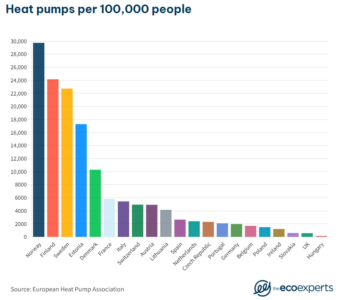For the last three weeks, all eyes have been on Paris for the 2024 Olympics. Top athletes from around the world have displayed amazing feats of human accomplishment, breaking numerous world records, often by incredible margins. But these aren’t the only records being broken – on July 22nd, while France was gearing up for the games, the world saw the hottest day ever recorded.
As our planet heats up, threatening every aspect of global life, countries across Europe are taking steps to lower their carbon emissions. A significant proportion of these emissions come from domestic heating. In the EU, buildings contribute to about 35% of greenhouse gas emissions, while in the UK, domestic heating contributes about 18% of all greenhouse gas emissions.
One of the key tools at our disposal to reduce heating emissions are heat pumps which are super-efficient and produce more heat than the electricity they consume. Heat pumps have been around for decades, but growth in Europe is increasing year-on-year as the need to decarbonise our homes becomes more apparent.
But which European countries have managed to progress furthest with heat decarbonisation and install the most heat pumps? Will it be gold for Great Britain?
To keep this fair, we will be looking at heat pump installations in proportion to population, specifically, how many heat pumps have been installed per 100,000 people living in the country. This is considering any heat pump – air source, ground source, or water source heat pump installed in a domestic property. The Paris Olympics may be over, but now we’ve set the rules, let the heat pump Olympics begin!
Taking home the bronze medal is Sweden, with 22,727 heat pumps installed per 100,000 people. The vast majority of new-build homes in Sweden have been built with a heat pump in the last 10 years, resulting in annual installations of over 100,000. With fossil fuels making up just 0.7% of Sweden’s electricity mix, these heat pumps are also running on some of the cleanest electricity in the world.
Next up, Finland takes silver. With 24,159 heat pumps per 100,000 people, Finland has been rapidly increasing heat pump deployment over the last couple of years, jumping from around 100,000 installations in 2020 to nearly 200,000 in 2022. Although they have a significantly higher fossil fuel proportion in their electricity mix at just over 10.6%, heat pump adoption has resulted in a reduction in total greenhouse gas emissions of just under 4%.
And finally, bringing home the gold, is Norway with 29,745 heat pumps per 100,000 people. Norway has been at the forefront of clean heating policy for years now, banning oil boilers entirely in 2020. They also boast a fossil fuel electricity mix of just 1.0%, meaning all of these heat pumps are running on almost entirely clean electricity.
You may notice a trend amongst our medallists – all three are Scandinavian countries. There are a number of reasons for this. It’s partly down to the temperature and the way Scandinavian houses are built to counter it. With the colder climate, their homes are better insulated than in other areas of Europe. More insulation means they maintain their temperatures for longer which is extremely valuable in improving heat pump efficiency. Another reason is the lack of radiators. The majority of Scandinavian homes use ventilated air heating rather than a water-based system. This allows heat pumps to directly replace either furnaces or direct electric heating, without the need for radiator upgrades that many homes in the UK require.
So how does the UK fare in this heat pump race?
Unfortunately, not that well. The UK has around 380,000 installed heat pumps – that’s just 564 per 100,000 people, ranking twentieth on the continent – as can be seen in the graph below from the Eco Experts. The UK government is targeting 600,000 annual heat pump installations by 2028, but in 2023, there were less than 40,000 installed across the country. Things are travelling in the right direction however, with applications for the Boiler Upgrade Scheme – the grant that helps with heat pump costs – up 73% in 2024 compared to 2023.

One way to improve heat pump uptake is to fit heat pumps with the right smart controls. National Grid’s Future Energy Scenarios report for 2023 stated that increasing heat pump efficiency by just 10% could result in a 15% increase in heat pump uptake by 2028. The Passiv Smart Thermostat, the new smart heat pump control solution from Passiv, increases heat pump efficiency by 17%, as independently verified by the Energy Savings Trust. If heat pumps across the UK can be optimised to run super-efficiently no matter the weather, then perhaps we’ll be in for a podium position at the next Olympics in 2028!




